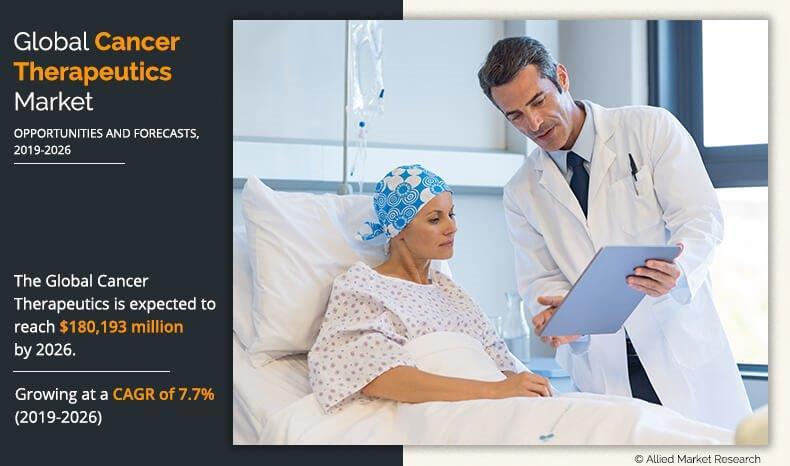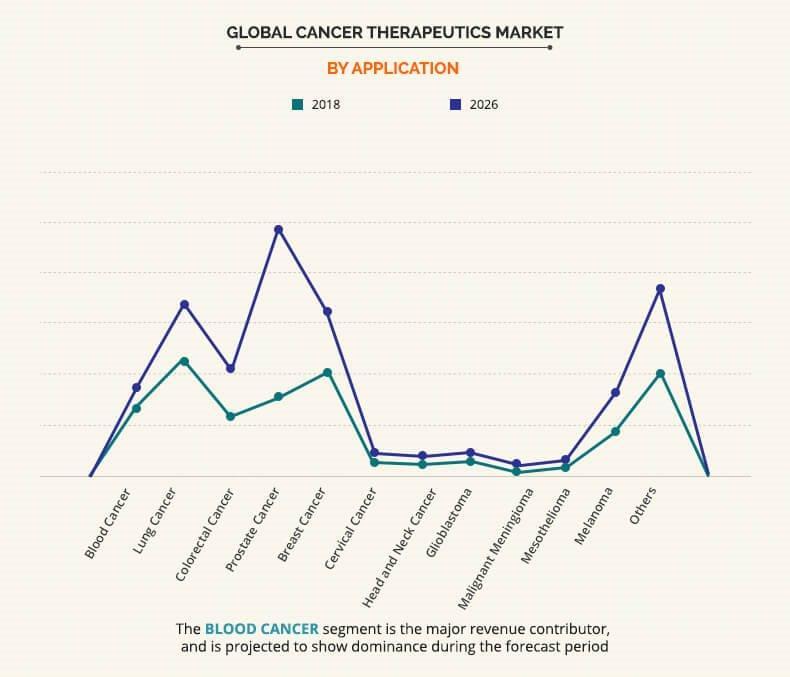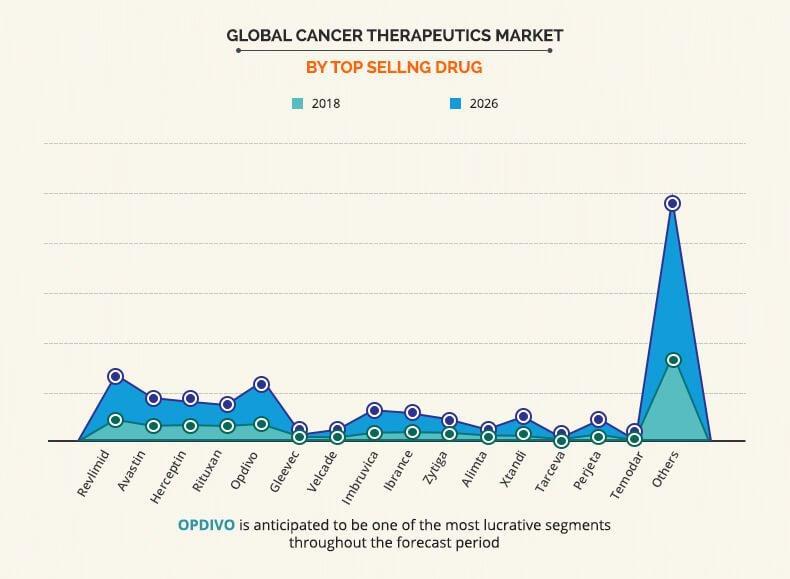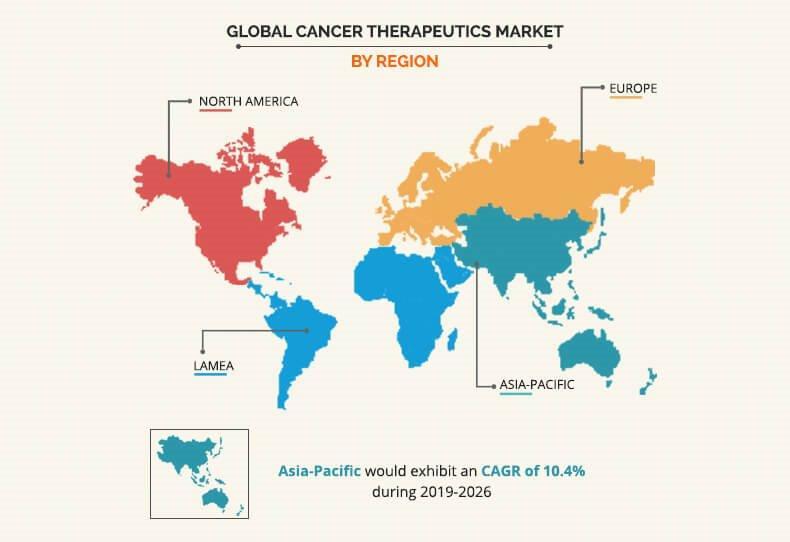Cancer Therapeutics Market Outlook, 2026
The global cancer therapeutics market size was valued at $98,900 million in 2018 and is estimated to reach at $180,193 million by 2026, registering a CAGR of 7.7% from 2019 to 2026. Cancer therapeutics involves the use and administration of chemotherapy and oncology drugs to treat cancer. Increase in cancer prevalence, surge in collaboration between pharmaceutical companies, and rise in cancer research are the key factors that augment the growth of the cancer therapeutics market. Furthermore, growth in geriatric population is expected to boost the market growth.
However, high cost associated with oncology drug development along with adverse effects associated with cancer therapeutics are some of the factors that restrain the market growth. Conversely, the upsurge in demand for personalized medicine and high potential of developing nations is expected to provide new opportunities for the market players in future.
Global Cancer Therapeutics Market Segmentation
The cancer therapeutics market is segmented based on application, top selling drugs, and region. Based on application, the market is divided into blood cancer, lung cancer, colorectal cancer, prostate cancer, breast cancer, cervical cancer, head & neck cancer, glioblastoma, malignant meningioma, mesothelioma, melanoma, and others. By top selling drugs, it is categorized into Revlimid, Avastin, Herceptin, Rituxan, Opdivo, Gleevec, Velcade, Imbruvica, Ibrance, Zytiga, Alimta, Xtandi, Tarceva, Perjeta, Temodar, and others. Region wise, it is analyzed across North America, Europe, Asia-Pacific, and LAMEA.
By Application
The global cancer therapeutics market trends are analyzed through the application vertical in the report. The lung cancer segment dominated the cancer therapeutics market, owing to the surge in prevalence of lung cancer and favorable government regulations toward lung cancer therapeutics.
By Top Selling Drug
The global cancer therapeutics market growth is also studied through the top selling drugs vertical in the report. The Revlimid segment occupied the largest share in the cancer therapeutics market in 2018, owing to the face that it received a breakthrough therapy designation. Revlimid (lenalidomide) belongs to the class of immunomodulatory drugs. It is an oral cancer drug indicated for multiple myeloma treatment. Revlimid functions against cancer cells partly by impacting the immune system. In October 2016, the combination therapy results of Revlimid and daratumumab (Johnson and Johnson) reported a surge in progression-free survival rate for patients suffering from refractory or relapsed multiple myeloma (or MM). This combination treatment was granted a breakthrough therapy designation by the FDA in July 2016.
By Region
The global cancer therapeutics market forecast is also analyzed through the region vertical. By region, North America is anticipated to occupy the largest share by 2026, owing to heavy funding by various organizations and increase in adoption of cancer therapeutics in this region. Moreover, rise in R&D investments is anticipated to facilitate the market growth during the forecast period. A rise in focus of vendors on the emerging markets, such as Asia-Pacific and LAMEA is expected to boost the market growth. Asia-Pacific is projected to witness significant growth in future, owing to increase in R&D investment and surge in cancer awareness. Furthermore, this region presents remarkable opportunities for the venture capitalists and investors, as the developed markets are comparatively saturated.
Increase in competition and continuous technological advancements have led to enhancements in the product portfolio; hence, product approvals and product development are one of the key developmental strategies adopted by the market players in the global cancer therapeutics market. For instance, in April 2018, the Swiss authority for the licensing and monitoring of therapeutic products (Swissmedic) granted approval for Roche's Alecensa (alectinib), as a first-line treatment for patients with advanced or metastatic ALK (anaplastic lymphoma kinase)-positive, non-small cell lung cancer (NSCLC).
Similarly, in November 2017, The U.S. FDA approved Roche's skin cancer drug Zelboraf for use in patients with Erdheim-Chester Disease, a rare type of blood cancer. Similarly, in Febrruary 2018, Health Canada approved Janssen's Zytiga (abiraterone acetate) in combination with prednisone and androgen deprivation therapy (ADT) for the treatment of patients with newly diagnosed, high-risk metastatic hormone-sensitive prostate cancer (mHSPC) who have received up to three months of prior ADT. Furthermore, in November 2017, the European Commission (EC) extended its approval to indicate Zytiga for the treatment of newly-diagnosed high-risk metastatic hormone-sensitive prostate cancer (mHSPC) in men in combination with androgen deprivation therapy (ADT).
Competition Analysis
The report provides an extensive competitive analysis and profiles of the key market players such as F. Hoffmann-La Roche AG, Bristol-Myers Squibb Company, AbbVie, Inc., Johnson & Johnson, Celgene Corporation, Astellas Pharma, Inc., Pfizer, Inc., Novartis AG, Merck KGaA, and Eli Lilly and Company. The other players in the value chain (not included in the report) include AstraZeneca plc, Bayer AG, and Takeda Pharmaceutical Company Limited.
Key Benefits for Cancer Therapeutics Market:
- This report entails a detailed quantitative cancer therapeutics market analysis from 2018 to 2026 to identify the prevailing opportunities along with strategic assessment of the global cancer therapeutics market.
- Market size and estimations are based on a comprehensive analysis of the applications, top selling drugs, and developments in the industry.
- An in-depth analysis based on region assists to understand the regional market and facilitate the strategic business planning.
- The development strategies adopted by the key market players are enlisted to understand the competitive scenario of the market.
Cancer Therapeutics Market Report Highlights
| Aspects | Details |
| By APPLICATION |
|
| By TOP SELLING DRUGS |
|
| By Region |
|
| Key Market Players | Pfizer Inc., Celgene Corporation, Eli Lilly and Company, AbbVie Inc., Johnson & Johnson, Novartis AG, Astellas Pharma Inc., Merck & Co., Inc., Bristol Myers Squibb Company, F. Hoffmann-La Roche Ltd. |
Analyst Review
The global cancer therapeutics market is experiencing a shift in therapeutic modalities—from the traditional cytotoxic agents to newly developed, targeted and immunotherapeutic modalities. The demand for targeted and biologics-based cancer therapeutics has increased considerably, owing to the increase in prevalence of cancer in both the developed and developing economies.
The cancer therapeutic market growth is propelled by upsurge in growth of geriatric population, increase in collaboration between pharmaceutical companies for development of novel cancer therapeutics, and surge in cancer awareness among populace.
The use of cancer therapeutics is highest in North America, owing to availability of oncology drugs, increased cancer awareness, and heavy expenditure by the government on healthcare, which is followed by Europe and Asia-Pacific. In addition, pharmaceutical companies have focused on expanding their presence in the emerging economies, which is anticipated to drive the market growth.
Loading Table Of Content...






